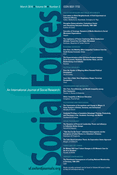-
Views
-
Cite
Cite
Kyle Dodson, The Undeserving Rich: American Beliefs about Inequality, Opportunity, and Redistribution By Leslie McCall Cambridge University Press. 2013. 312 pages. 29.99 paperback, Social Forces, Volume 94, Issue 3, March 2016, Page e80, https://doi.org/10.1093/sf/sou043
Close - Share Icon Share
Extract
The current economic climate has witnessed a number of remarkable developments: the steady rise in income inequality, the Great Recession, government bailouts of an unprecedented scale, and the Occupy Wall Street movement. Leslie McCall's latest book, The Undeserving Rich, puts these events in an important historical context and boldly questions many of the basic tenets that political and economic sociologists take for granted. In particular, it challenges the accepted wisdom that Americans are either ignorant of or ambivalent toward issues of economic inequality. In its place, McCall provides an alternative reading of American views toward inequality, one that characterizes Americans as competent consumers of information who respond predictably to trends in economic conditions. In staking out this position, she argues that Americans make a key distinction between equality of opportunity and equality of outcomes, and raises the possibility that Americans want the state to guarantee the former rather than the latter. The resulting portrait casts Americans as fundamentally concerned with inequality, particularly when the fruits of economic growth are reaped only by the affluent.



